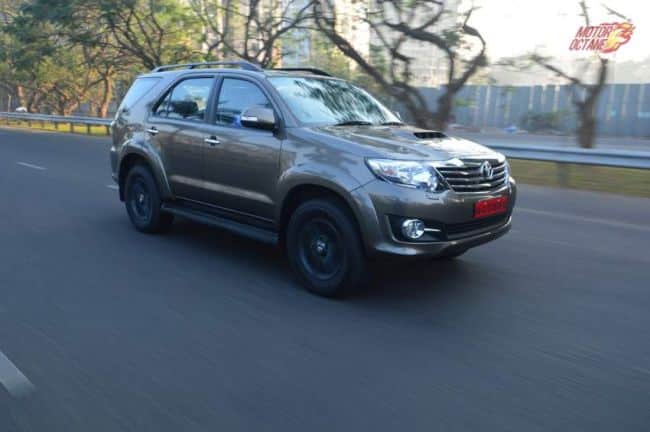Toyota considering Petrol variants for Fortuner & Innova

The diesel-engine ban has had severe repercussions for the automotive industry on the whole. Car manufacturers had invested huge amounts towards the building of diesel engine plants. Along with it, they had also committed towards ramping up tooling and assembly lines in favour of diesel powered models. But, after years of a supportive policy framework, all those investments are at risk of being unusable. To hedge their risks, car majors like Toyota Kirloskar Motor (TKM) are have already begun to consider petrol engines as an option on all future launches from their stable.
The Indian arm of Toyota sells the Innova MPV and the Fortuner SUV, and these two models form the largest chunk of sales here in the domestic market. With both these models being powered by diesel engines above the crucial 2000cc cut-off as laid down by the honourable Supreme Court, the company is exploring all alternatives. Currently, both, the company has had to shut down sales of the Innova as well as the Fortuner in the National Capital Region (NCR). The existing ban on registration of diesel vehicles over 2000cc capacity is valid only for three months since the date of the ruling. However, the auto-major along with others in the industry fears that the ban could be extended for a further period of time.
The Innova, for example, did indeed come in a petrol variant when it was launched by the company. However, the lacklustre demand for it on account of the higher fuel prices and relatively poor fuel economy, meant that Toyota had to discontinue it eventually. With the demand starting to swing away from diesels once-again, the company is contemplating a reintroduction of a petrol-engine Innova in the market.
Even as it is preparing to evaluate such a change in strategy, Toyota is indeed going into appeal the Supreme Court ruling banning registration of high-capacity diesel vehicles. The Japanese major is joined by other Indian auto-manufacturers affected by the ban. They opine that it is the older vehicles that pollute more, on account of age related wear & tear, as well as by virtue of being built to earlier emissions norms, which weren’t as stringent as they are now. Thus, if at all vehicles are to be taken off the roads, it should be the older ones and not those that are manufactured currently.
The debate on diesel engines and vehicular pollution is a hotly contested one. There are multiple players, with each one of them having their own, vested interests. Any ruling is bound to adversely affect a few players more than the others. What remains to be seen is whether people in general, would eventually profit from better transportation solutions and infrastructure augmentation? Or would this issue be eventually settled in favour of those with the most clout, financial and otherwise. The battle-lines have been drawn and every new development is quietly shaping up our future, whether we realize it or not.

Comments